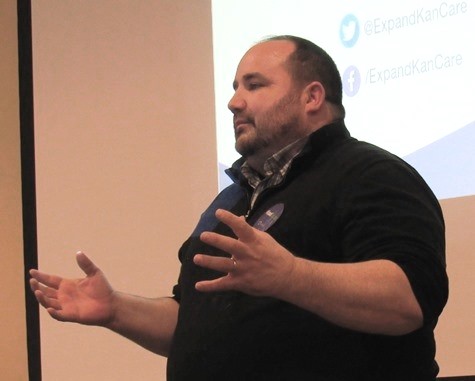
for KanCare expansion. KanCare is the Kansas form of Medicaid. (Staff photo by Mary Rupert)
by Mary Rupert
A 31-year-old woman went to see a local doctor after having had a miscarriage, and was tested.
“I knew that she had cancer,” a local obstetrician told an audience on Saturday afternoon at Donnelly College’s event center in Kansas City, Kansas.
But the woman had no insurance. She fell into the Medicaid coverage gap. Her husband made too much money to get into KanCare, the state’s Medicaid program, the doctor said. The woman and her husband had two children. Her condition was very treatable, she said. The doctor was very concerned that the woman might not seek treatment.
“Most (with her condition) usually die in a couple of years if they don’t get treated, and I don’t want that for (her) or for anybody,” the obstetrician said, as she held back her tears.
The woman is just one of 150,000 Kansans and 11,000 Wyandotte County residents who could get insurance if Medicaid was expanded, according to the doctor. The doctor contrasted this patient with another of her former patients in another state who had access to Medicaid and was able to give birth to a healthy baby even though she had diabetes.
“I am resolved to fight and not give up and to work on KanCare expansion,” the doctor said.
The doctor was one of several people telling about the need for KanCare expansion at a rally Saturday afternoon at Donnelly College, sponsored by the Alliance for a Healthy Kansas.
A KanCare expansion bill was passed last year by the Kansas Legislature, but it was vetoed by the governor. The Legislature came within three votes of overriding it in the House and two votes in the Senate, but could not muster enough votes. Backers of Medicaid expansion are planning to renew their efforts to get it passed this year, and are holding rallies throughout the state. All Wyandotte County Democrats in the Legislature supported Medicaid expansion last year.
Sheldon Weisgrau, director of the Health Reform Resource Project, said the issue is still on the table in Topeka. About $2.3 billion in federal funding has been forfeited by not expanding KanCare, he said.
“This is the most impactful health care legislation they will ever vote on,” he said.
Legislators who support KanCare expansion are not sure if they can get the law enacted.
State Rep. Pam Curtis, D-32nd Dist., who attended Saturday’s meeting, said getting KanCare passed would be “challenging, but I’m hopeful. We got so close last year.”
She said it was not true that the expanded KanCare recipients are not working. Many are working, but are not making enough money to afford health care, she said. Some have to rely on safety net clinics currently.
“This is the right thing to do,” Rep. Curtis said. “I’m hopeful.”
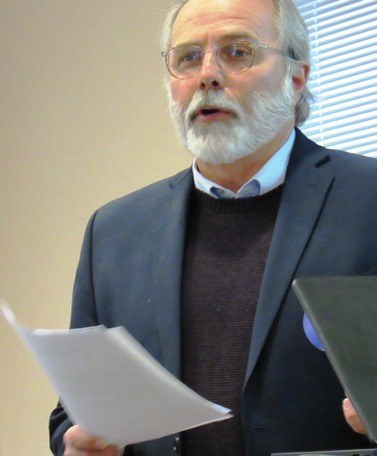
The Rev. Rick Behrens, pastor of Grandview Park Presbyterian Church, said the Bible was clear about the requirements to care for the poor and vulnerable.
“All of us at some point have been or will be vulnerable, weak and poor,” Behrens said.
“More than 11,000 children of God here in Wyandotte County, more than 150,000 children of God across the state are being denied health, shalom, well-being and care,” Behrens said. There are more people in Kansas who are undocumented and also are shut out, he added.
“The time is long past for us to rally and seize the wheel,” Behrens said. “Too many have died. Too many are dying. God’s children are calling out for justice. For four years now this has been a possibility and they have denied the possibility.”
He called for the KanCare expansion advocates to “imagine new ways to jam the spokes and take the wheel.”
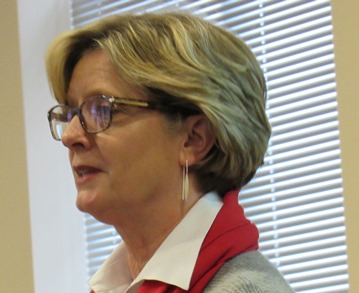
Stephene Moore, former Health and Human Services regional director, and former candidate for Congress, said that as a nurse, health care is important to her. She recalled that when she was regional director of HHS, she could not get access to the officials at the top of the state government in Kansas to talk about these issues.
She asked those in attendance to talk to their neighbors, legislators and public officials about expanding KanCare.
“We only need a few people to turn their votes over,” she said.
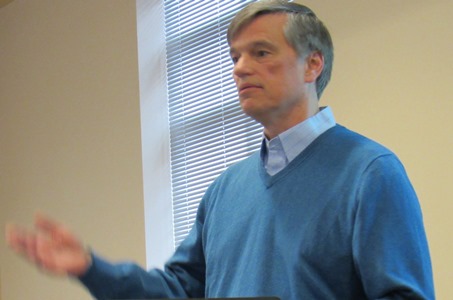
Randy Callstrom, president at Wyandot Inc., said last year, a community survey identified access to health care, mental health and dental care, as one of the needs here.
He said it was a false notion that if KanCare recipients got jobs, they would have health insurance available to them. He said they see a lot of clients who are working full time or part time and do not have health insurance. Health insurance was not offered to some of them, or it was too expensive for them to afford, he said.
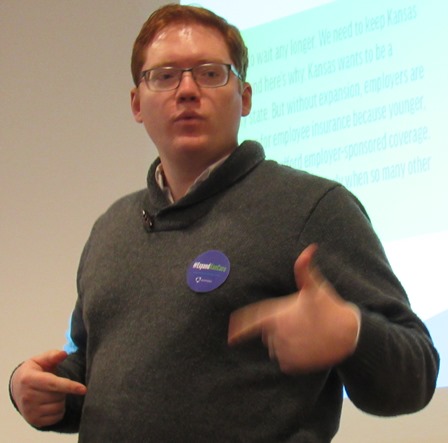
“We can make a difference when we work together,” said Matt Kleinmann, a doctoral student in architecture from the University of Kansas. He has worked with community residents here on food access issues.
When people walk on trails at a park at Jersey Creek, they see signs to get their blood pressures checked, he said. He added he once talked with a resident who a doctor might tell to eat more fruit and vegetables, but what if she can’t find them? What can she do if she can’t get to the doctor, he asked.
What does it mean for 100,000 Kansans if they don’t have access to a doctor and KanCare can’t be expanded, he asked.
He urged those attending to fight for KanCare expansion for working families, seniors and children without access to health care.
Anne Rauth, of Mercy and Truth Clinics, said the agency’s two safety net clinics here see about 6,000 patients. She said she felt she was talking for every one of the patients who can’t afford health insurance.
She talked about a child born recently, who is on KanCare. She said advocates for expanding KanCare need to be dedicated in continuing their work in expanding KanCare.
At Vibrant Health, which has about 9,000 patients here in three safety net clinics, about 40 percent of the patients are uninsured, said Patrick Sallee, executive director.
“When they can access health care, the kids are healthier, the kids are in school. The parents are healthier, the parents can go to work,” Sallee said. “If they can’t access health care, all of those things get harder and harder on the family, and make it harder and harder for them to survive and make good choices and thrive in this state and in this community.”
KanCare expansion would expand the opportunities for families to access care with safety clinics and other providers, so they can stay healthy and strong, and go to work and school, he said. KanCare expansion also would mean there would be opportunities to hire more doctors, nurses, assistants, and create more jobs, he said. KanCare expansion would allow a patient to see the same doctor on a regular basis, he added, not just see a doctor once.
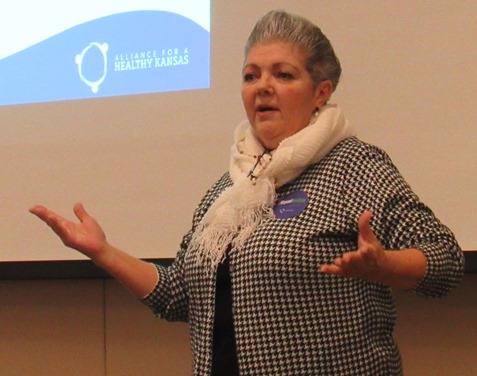
Cielo Fernandez of El Centro said there are clients who are in the gap, do not have insurance and cannot get access to health care.
It’s El Centro’s job to try to get access for them, knocking on the doors of hospitals and providers, she added. If someone has cancer and does not have insurance, the doors are closed and they are not eligible to apply for a discount, she said. Students who are 19 years old may have aged out of the Medicaid system, without insurance, and are without health care. Some clients have jobs, cannot afford health care, and pay a penalty on their taxes, she said.
“That is not fair that in the richest country of the world – it is still (a) wonderful (country) – but we have to be fair with all our citizens,” she said.
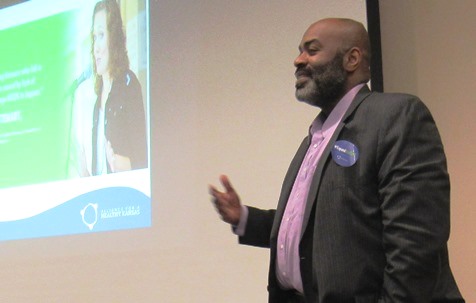
Jerry Jones of the Community Health Council of Wyandotte County said the question is who should be included?
“All of us should be included in KanCare,” he said.
Health care is like a big banquet spread out just for some, and outside the door, there is a family including a mother and child, senior citizens, and working people, waiting to come in. Most of the people in the room are OK with them coming in to the banquet, but five people inside say no, they are not allowed to come in, he said.
“Are we just going to let five people keep all of those folks out there from the table of plenty?” he asked. “That’s our challenge. The choice is ours.
“When we are talking about KanCare expansion, we are also talking about KanCare inclusion,” Jones said. “We are done excluding people from the health care table of plenty.”
David Jordan, executive director of the Alliance for a Healthy Kansas, said, “We need to continue to fight that in America, everyone has the right to see a doctor when they need to.”
He told the story of a woman in her 50s in a small city in Kansas, who is in a coverage gap. If she had coverage, she would have had a colonoscopy, he said. Why, he asked, should there be a difference in her being able to have that test if she lived in Colorado and not Kansas?
“People’s health shouldn’t be a matter of where you live,” Jordan said. “We are so close to getting there, we need to redouble our efforts.”
To reach Mary Rupert, editor, email maryr@g3f.1db.myftpupload.com.
